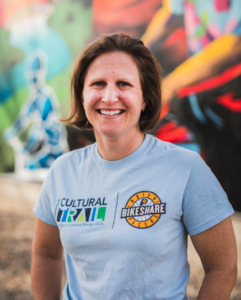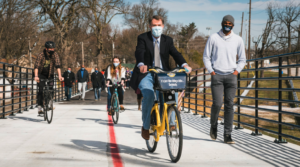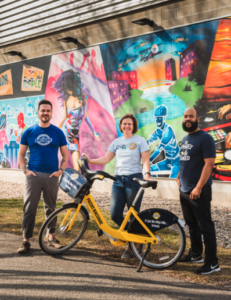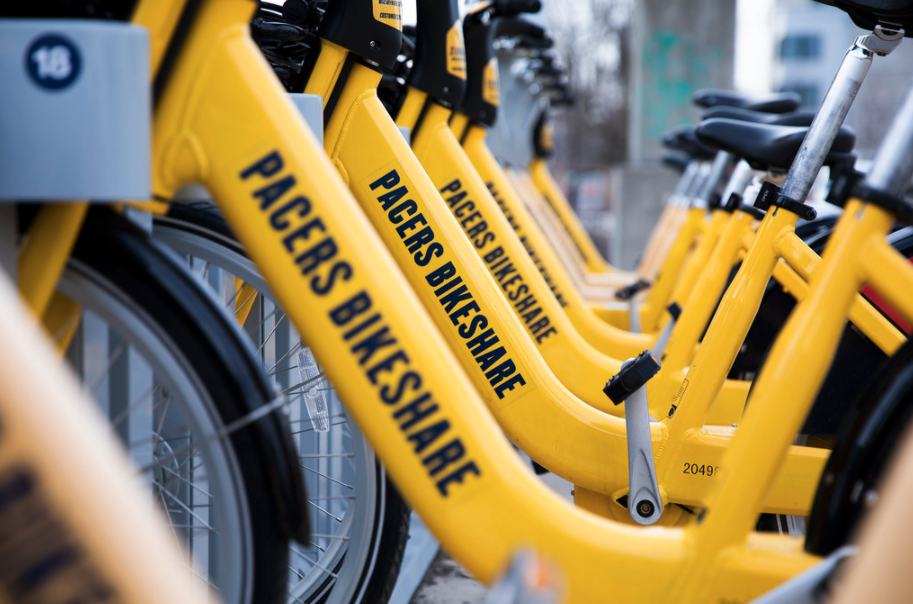Catch a Ride
Pacers Bikeshare System Makes it Easy to Experience Indy
Writer / Jon Shoulders
Photographer / Michael Durr
 Back in 2012, about one year before completion of the eight miles of urban bike and pedestrian paths that comprise the Indianapolis Cultural Trail: A Legacy of Gene and Marilyn Glick, leaders of that project began thinking about ways to help residents and city visitors access and experience all that the Cultural Trail offers. Soon, a plan for a bike-sharing concept began to emerge.
Back in 2012, about one year before completion of the eight miles of urban bike and pedestrian paths that comprise the Indianapolis Cultural Trail: A Legacy of Gene and Marilyn Glick, leaders of that project began thinking about ways to help residents and city visitors access and experience all that the Cultural Trail offers. Soon, a plan for a bike-sharing concept began to emerge.
With the eight-mile Trail in downtown, it made it possible to have a bikeshare program in the city, says Kären Haley, executive director of the Indianapolis Cultural Trail. Back when the Trail was coming to life, we knew that people were going to use the Cultural Trail to ride bikes. We were thinking about how to continue to make it accessible for people, and available to residents and visitors. Providing bikes through a sharing program seemed like a really great next step for the city, for residents and visitors to be able to get around on the Trail.
Later in 2012, the Cultural Trail team sought out a bike service provider for the planned bikeshare program, eventually partnered with BCycle, a company owned by Trek Bicycle Corporation, and obtained Trek bikes for each station. The bikes feature adjustable seats, lights on the front and back, bells, and baskets for securely carrying personal items. Each bike is also equipped with a secondary lock for riders who wish to, for example, briefly run an errand and lock a bike securely without a station nearby.
The bikeshare system was officially launched on April 22, 2014. By that point, 29 stations with a total of 250 bikes were operational along the Cultural Trail. Since then, those numbers have grown to 50 stations totaling 525 bikes available around the city, including a Broad Ripple station presence since September of 2019.
 On the Trail youre separated from cars and the street, and you can feel safe and comfortable riding a bike no matter who you are or what your ability is, Haley says. Broad Ripple has been a very popular station, as well as our station a little bit more south at Westfield and Illinois streets – that ones key because its so close to the Red Line. You can take a bike after you take the Red Line, and have that interplay of available public transit.
On the Trail youre separated from cars and the street, and you can feel safe and comfortable riding a bike no matter who you are or what your ability is, Haley says. Broad Ripple has been a very popular station, as well as our station a little bit more south at Westfield and Illinois streets – that ones key because its so close to the Red Line. You can take a bike after you take the Red Line, and have that interplay of available public transit.
The program was primarily funded through a federal transportation grant obtained in partnership with the City of Indianapolis, as well as a philanthropic gift from the Herbert Simon Family Foundation.
That philanthropic gift is how we got the name Pacers Bikeshare, Haley says.
The system was immediately well-received according to Haley, and soon questions began coming in from locals regarding what was next for the program. After obtaining additional funding, Cultural Trail leaders worked alongside the Department of Public Works to carefully plan and expand the system. The organization also incorporated input from local residents and owners of property adjacent to the greenway system, after holding several public meetings to discuss expansion.
We worked in partnership with the city to apply for more federal funding, continuing to look at the data that showed us people were riding on the Cultural Trail and along the greenways, Haley says. We then looked to expand outside the downtown area, along the citys greenway system including the Monon Trail, and along the citys protected bike lane network. We also wanted to use stations to encourage more bicycle infrastructure.
The bikes can be accessed 24/7 throughout the year, and riders can return the bikes at any station. There are several options to pay for rides – users can purchase an annual pass for $125, which includes unlimited 60-minute trips, or choose a pay-as-you-ride option, which costs $1 to access a bike, and 15 cents per minute for the duration of a trip. The time frame for the annual pass starts running from the first time a customer actually checks out a bike – not at the time of purchasing the pass.
 The bikes are a little of everything – theres an exercise component, a leisure component, and its also public transportation where people use these to get to work and run errands, Haley says.
The bikes are a little of everything – theres an exercise component, a leisure component, and its also public transportation where people use these to get to work and run errands, Haley says.
With the recent opening of a bridge bringing the Monon Trail over 38th Street, bikeshare users have more accessibility and safe connectivity throughout the city than ever before. The 38th Street bridge opened in March, eliminating the need for bikers and pedestrians to deal with six lanes of traffic while crossing.
The Cultural Trail staff has also launched the EveryBody Rides program, which helps to provide opportunities for all people to access to the bikeshare system, regardless of factors like income level. Qualifying individuals can obtain a subsidized annual pass for $5 per month.
That program is really popular, and with a lot of people in income-challenged situations right now, if you can pay $5 for your transportation for the month, thats going to help, Haley says.
Since the COVID-19 pandemic took hold, the Cultural Trail staff has continued to sanitize bikes as theyve come into the main office for maintenance before sending them back out in the field, and theyve put out constant messaging on social media and newsletters reminding riders to use sanitizer before and after bike use.
Haley adds that the Cultural Trail team continues to work with the Indy Department of Public Works to leverage federal funding opportunities, towards potential future expansion.
2024 is when were in line for our next federal funding, so that would be another infusion into the bikeshare system, Haley says. In the meantime were always thinking about how to serve more neighborhoods and more residents, and looking at where there is bike infrastructure where we can put stations to set people up for success. Making stations highly visible and recognizable is also important – places where the community feels comfortable going.
Haley says people of all ages continue to enjoy the bikes, and ages 8 to 80 can use them.
I see kids, I see grandparents, and I think its because theyre easy to ride and adjustable, she says. Its one of the best ways to see the city. You can easily go to a station, hop on a bike, and easily see so much of what Indy has to offer.
For more info including a station map, visit pacersbikeshare.org.





